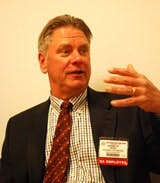Business Metrics Driving Plant-Wide Control and Optimization
"We are extremely pleased with the response of the market to the introduction of PlantPAx—it has really stuck," said Ken Deken, Rockwell Automation vice president for portfolio management. "We struggled with how to explain it for a while, but we've now made it clear that it is a plant-wide control and optimization system that is characterized specifically for the process industries—batch, continuous and hybrid."
Walt Boyes, editor-in-chief of Control, caught up with Deken at this week's Automation Fair 2009 to see how market acceptance of the PlantPAx vision has progressed since the company announced it at last year's Automation Fair. Steve Pulsifer, director of process market development, and Scott Anthony, global commercial program manager for process automation, also joined the conversation.
Pulsifer pointed out that he believes that it is the tremendous growth in computing power that today allows PlantPAx to be a truly distributed system. "We've taken advantage of the advances in networking and computing capability to create what the DCS should have been in the first place—a completely distributed control system that works on a common platform throughout the plant."
"We are getting the message across that PlantPAx isn't just another DCS—it is more than a DCS," Anthony added.
The growing acceptance of the PlantPAx has a lot to do with the metrics process manufacturers increasingly are using to gauge their business performance, Deken pointed out. "If you're measuring the right kinds of things, you'll be led to the correct decisions. The correct metrics create the pressure to do plant-wide optimization and plant-wide control; metrics let business leaders take what would ordinarily be a leap of faith as a straightforward business decision."
"Once you get past that," Pulsifer said, "the discussion gets down to business quickly. We have such a big footprint in the process industries already, with PLCs and HMIs in the discrete and batch parts of plants that people are beginning to understand the message about plant-wide control and multi-discipline control architecture. And Rockwell Automation is already there. We already have a relationship."
"Plus," he continued, "we've gone out and acquired talent with the in-depth industry experience, the applications savvy and the experience working with the other competitive platforms in the process industries to enable us to speak from deep knowledge about process solutions and migration to PlantPAx from any other platform. And the more projects we do, we learn from our customers how to tailor PlantPAx even more closely to what they want."
"The economy has actually helped the process initiative, handing us a lot of first time wins," Deken said. "As the economy picks up, we're going to see more wins from those customers as they expand on the capabilities of PlantPAx. If we look at the process market, which by some measures is in excess of $20 billion per year, we are happy to be taking share in those segments where we work well. Plus, the shift to main automation contractors (MACs) and the increasing use of skid-builders and OEMs in the process industries are playing to our strengths."
"When you think about why people would, or wouldn't, move forward with plant-wide optimization," Pulsifer noted, "you really have to talk about corporate culture. Aberdeen's leading companies are leaders because they build this kind of initiative into their cultures."
"And it has to come from the top down," Deken chimed in. "Companies like Procter & Gamble, General Mills and Coca-Cola, who've all spoken here [at Automation Fair] about their plant-wide optimization initiatives in both process control and sustainability, have been handed a clear mandate to do these things directly from top management."
"It's time," Deken said, "for us to recognize the flattening of the model. The Purdue model just isn't accurate any longer. You've noted that both Jeff Kent from Procter & Gamble and Dave Bynum from Coca-Cola said that their Rockwell Automation sales people are talking to way different people in their enterprises than they used to. Today, we're selling to IT folks and even to the CFO. That's what it is going to take to move the laggard companies. They have to be brought to see the wins they could be having with plant-wide control and optimization. That's our challenge."


